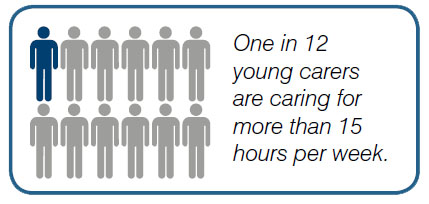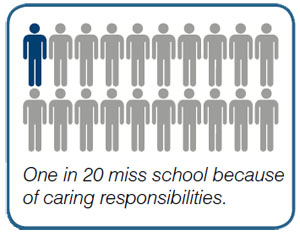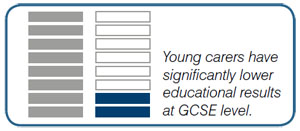 Young carers play a very important role in our society, helping and supporting members of their family who may need them to help them in some way physically and/or emotionally. They often go unnoticed and don’t get the help and support that they need.
Young carers play a very important role in our society, helping and supporting members of their family who may need them to help them in some way physically and/or emotionally. They often go unnoticed and don’t get the help and support that they need.
Many professionals will come into contact with young carers on a regular basis. This may be more relevant for those working in education, health or social care. If your role centres around supporting an adult with an illness or a disability, you are also in a good position to identify a child or young person who may be a young carer and ensure the correct support is put in place.
It isn’t always obvious when a child or young person is caring for someone, with often, only extreme cases being brought to the attention of the relevant services.
It is vital that professionals are able to identify and offer support at an early stage - without identification and support, young carers are at risk of underachieving.
Who are young carers?
Young carers are children and young people from the age of 5 to 18 who care for a parent or relative at home who is ill, has a physical or learning disability, is affected by drug or alcohol misuse, is affected by AIDS/HIV or has a sensory impairment.
The level of care they undertake would usually be carried out by an adult and therefore, it has a significant impact on their childhood.
Whilst other children and young people are out playing and having fun with their friends, young carers maybe at home, helping members of their family who are unable to do certain things for themselves. They look after parents, brothers, sisters, even grandparents. With so much to do, young carers can miss out on their childhood.
At school, they can fall behind on their homework, be too tired to concentrate in class or sometimes, they may be bullied for being different. Young carers are just the same as any other child or young person, it’s just that they have extra responsibilities. These responsibilities can have both positive and negative impacts on their lives.
How do I identify a young carer?
 Many young carers do not tell others about their caring role and have no support. It is therefore important that as a professional working with children and young people, you are aware of how to identify young carers in your field of work. Here are some signs to look out for:
Many young carers do not tell others about their caring role and have no support. It is therefore important that as a professional working with children and young people, you are aware of how to identify young carers in your field of work. Here are some signs to look out for:
- May often be tired, stressed, anxious or depressed
- The presence of an illness or disability in the family
- May often be late or absent from school, and underachieving
- Have difficulty in joining in after school activities
- May be isolated or a victim of bullying
- May appear unkempt
- May have behavioural problems
- May have physical problems such as back pain
- False maturity (seeming older than their years).
What do young carers need?
- For their role to be acknowledged and valued
- To be respected and valued
- Information about support and their relative’s illness/disability
- Someone who will listen and talk to them
- A break from their caring role
- To feel cared for themselves
- To be part of decision making in relation to themselves and their family
- Opportunities to mix with peers and other young carers
- Help with planning their future
Responsibilities of a young carer
Care which is provided by a young carer can range across a variety of tasks both in and out of the family home including:
- Domestic tasks – cooking, cleaning, washing, ironing, shopping, gardening
- Emotional support – observing someone’s emotional state, providing supervision, keeping someone company, talking to someone, listening to someone
- General care – administration of medicines, changing dressings and assisting with mobility
- Intimate care - lifting, washing, dressing, helping with toilet requirements
- Childcare – responsibility for helping/looking after siblings
- Financial – helping with banking, bills, benefits
- Interpreting – translating or interpretation for a family member, for speech or hearing impairments or as English as an additional language.
Young carers at school
 Young carers are like all other children and young people, dealing with every day life, at home, at school and with their peers. However, they have the added pressure and the responsibility of caring for a family member at home.
Young carers are like all other children and young people, dealing with every day life, at home, at school and with their peers. However, they have the added pressure and the responsibility of caring for a family member at home.
School can be a place where they are allowed to escape these responsibilities and pressures, a place of normality, where they can just be themselves. Unfortunately, for some young carers, school can also be a place where they feel like they don’t belong, a place where they feel even more pressure.
Difficulties young carers may face in school:
- Absence/Lateness
- Poor grades
- Bullying
- Homework difficulties
- Behavioural Issues
- Anxiety
- Limited time to access after school activities
Schools should be proactive in identifying young carers as soon as possible, not only when there is an issue with attendance and lateness. Remember, young carers are not easy to identify and many will actively try to conceal their caring role.
It is important for pupils to see that provisions are already in place within their school before they identify themselves as a young carer.
- Sign up to the Wigan Council young carers school charter
- Invite a Wigan and Leigh young carers worker into your school to do awareness raising sessions/assemblies/lesson plans/training
- Provide opportunities for identification following assemblies and PHSE lessons
- Have a named person within school who will be a young carers lead and who will act as the first point of contact for young carers, their families and other agencies
- Develop a secure and safe environment where pupils and their families have the confidence to let staff know that they are a young carer in private
- Use an awareness raising event such as carer’s week
- Develop good working partnerships with local organisations who offer opportunities to young carers
- Consider setting up a buddy/mentor system